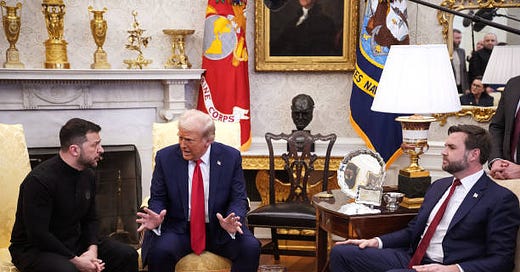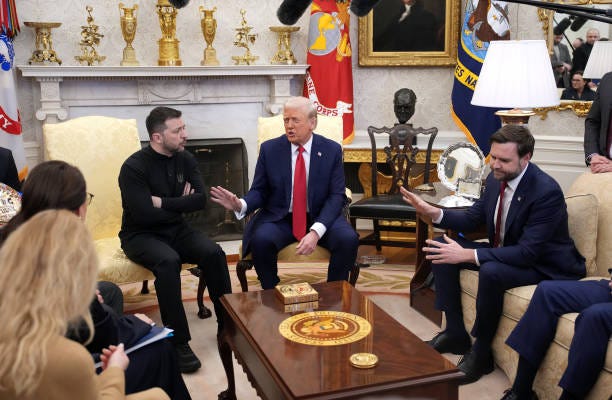When President Volodymyr Zelensky visited the United States, specifically the White House, many hoped it would mark a united stand in supporting Ukraine amidst one of the most significant global crises of our time. Instead, what unfolded appeared to be a calculated effort by former President Donald Trump and Senator JD Vance to humiliate and undermine a leader fighting to save his nation.
I’m convinced this entire situation was a setup. Here’s why.
A Calculated Embarrassment
Behind closed doors, Trump and Vance seemed to have orchestrated this debacle to publicly dismiss Zelensky’s leadership and credibility. Statements from behind-the-scenes accounts imply that the discussions before the meeting were manipulative, feeding Zelensky misinformation about how his leadership was perceived.
When the meeting finally happened, Trump relied on his trademark attacks, publicly blaming Zelensky for the war in Ukraine and parroting Russian propaganda that casts Zelensky as authoritarian. Zelensky faced baseless accusations, including claims that he initiated the war his people are courageously fighting. According to AP News, the meeting devolved into hostility, leading to Trump berating Zelensky for "gambling with millions of lives." Zelensky left the White House without signing a minerals deal, a landmark agreement Ukraine had anticipated.
This breakdown was no accident. Trump’s refusal to hold Russia accountable for its aggressive invasion and his consistent praise of Vladimir Putin play into a broader pattern we’ve seen from the former president—a tendency to protect those who threaten global stability, as opposed to standing with allies who support democracy.
What’s more telling? World leaders who deserve careful criticism—Putin, Kim Jong Un, and others—don’t face the same disdain from Trump as leaders of allied nations like Zelensky.
Trump’s Fear and Affection for Putin
Why does Trump refuse to criticize Putin? The answer, as I see it, is fear. Trump’s deep reluctance to challenge Putin speaks to a deference that borders on cowardice. By shielding Putin from criticism, Trump weakens the U.S.’s voice in condemning autocratic regimes and makes our country appear unwilling to lead in global crises.
This also reveals Trump’s transactional approach to diplomacy. What’s in it for me? His loud calls for "minerals" and "services rendered" in exchange for U.S. support to Ukraine are a stark departure from the values and principles America has historically stood for—helping those in need and upholding democracy.
The Bigger Problem at Hand
What troubles me most, though, isn’t just Trump’s behavior or his dangerous alignment with Putin. It’s how his leadership mirrors dark chapters of history.
Firing generals who don’t pledge unconditional loyalty? Undermining constitutional safeguards? This echoes tactics from authoritarian leaders of the past—including Nazi Germany—where government officials were removed for prioritizing national integrity over blind allegiance. Imagine generals being dismissed not for wrongdoing but simply for refusing to prioritize the whims of a leader over their constitutional duty.
Additionally, the rhetoric surrounding people of color and women in positions of power is dangerous. The insinuation that minority groups are "diversity hires" while white males are inherently qualified feeds into systemic prejudice, widening divides and eroding trust in institutions.
Why Zelensky's Outrage is Justified
Zelensky wasn’t just fighting for Ukraine in that Oval Office meeting—he was fighting for recognition of the truth. Russia attacked Ukraine. Russia initiated this war. And while Trump paraded his indifference, attacking his allies instead of adversaries, the cracks in America’s global standing grew deeper.
Zelensky had every right to be outraged. His plea for continued U.S. support was dismissed in favor of insults and baseless propaganda, making an already dire situation more volatile. What Trump and Vance did wasn’t strength—it was petty, juvenile, and damaging on an international scale.
A Call to Action
This situation is a sobering reminder of what’s at stake. Trump’s behavior toward Zelensky exposes a disregard for global alliances and a preference for aligning with leaders who challenge democratic principles.
As Americans—and as global citizens—we need to remain vigilant. Our courts, our elections, and our representatives hold the power to shape our future. With midterms behind us and future elections on the horizon, it’s imperative to hold leaders accountable.
This isn’t just about Trump or Vance or Zelensky. It’s about the kind of country we want to be. Do we stand for the values of truth, democracy, and mutual respect, or do we fold into the dangerous patterns of blaming allies and cozying up to adversaries?
The time to act is now. Use your voice. Stay informed. Vote for leaders who understand the weight of their responsibility. Together, we can ensure that our country remains a beacon of democracy and freedom, not an enabler of authoritarian aggression.





